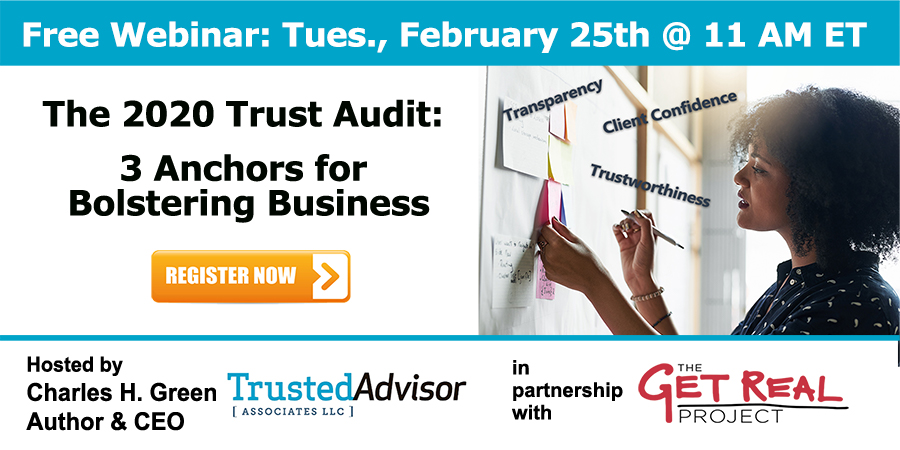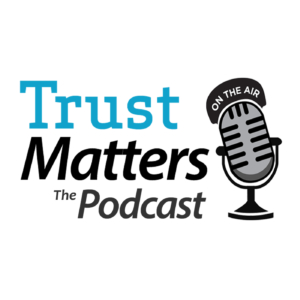
Here are two (real) digital communications I recently received. What jumps out at you about the differences between the two?
The first:
Charles,
Not sure if you got a chance to read my last 2 emails but I still wanted to see if what we do is something that you could benefit from.
Also as you can probably tell, our business thrives off of referrals from people who understand and have experienced the value in our services. So if you know anyone who would be a good fit, we’d love to meet them!
Feel free to give me a call at xxx.xxx.xxxx or shoot me reply [sic].
Talk to you soon!
– [name]
The second:
Hi Charles H., thanks for connecting!
As retirement approaches, we’re faced with a lot of questions: How much longer will I need to work? Do I have enough saved for the retirement I want? How much should I set aside for my kids? It takes a team to find the answers that are right for you, and with over 36 years of experience in wealth management – and becoming a part of my clients’ families – I love being a member of that team.
My approach to wealth management is unique; it’s what earned me a spot on Barron’s ranking of America’s Top 1,200 Financial Advisors. A holistic look at your financial future can save you money and worry down the line. Your wealth encompasses a lifetime of hard work and efforts. Don’t you think in an ever more complex world it would be smart for you to get a second review of your life’s plan? Interested in learning more? Grab some time on my calendar:[calendly.com invitation]
All the best, [name, Senior Vice President Wealth Management – Portfolio Manager at one of the top 5 wealth management firms in the world]
——————
So – what’s the difference between the two?
In my opinion: basically nothing.
Yes, I know. The first one is garden variety email spam, enabled by zero-marginal-cost lists, that predictably hit my email ‘junk’ folder, with a bit of added annoyance (“not sure if you had a chance to read my previous two spam emails…”).
The second one came in response to my accepting a LinkedIn connection request.
Now, maybe you think there’s a huge difference between an unrequested spam email on the one hand, and the “opt-in” nature of a response to my acceptance of a LinkedIn request on the other. Maybe you think that the LinkedIn request was carefully tailored to fit a targeted segment which included me, and that therefore I’m far more likely to be interested in the pitch.
I’m not buying it. It’s all spam. Here’s why.
Targeting vs. Personalization
First of all, if you’re selling a B2C product with mass appeal that retails for under $50, and your brand name or reputation means nothing to you, then you can ignore the rest of this rant. I’m not going to argue with you, and maybe you’re right for your business.
But – if you’re a business dealing in products or services which are complex, expensive, have significant effects on the buyer, and which involve trust, reputation and branding – and you care about those things – then lean in.
The buying process for such categories is inescapably personal (with the decision to entrust one’s life savings among the most personal). The selling process ought, it seems to me, to respect and reflect the nature of that buying process.
And yet – no doubt influenced by the savvy digital marketers employed by that global wealth management firm – this Senior VP sees fit to send me the equivalent of a highway billboard. (Let’s not even dwell on the scraped name “Charles H.”; how many people go by first-name-middle-initial?)
Way back in the 90s, Don Peppers and Martha Rogers wrote about the promised future of marketing as enabling one-to-one relationships. Not “one-to-one targeting,” but “one-to-one relationships.”
The difference has been lost in the Googlified and ad-tech-drenched marketing world of 2019.
Go back and look over the banker’s message to me. It’s all about him and his bank – not a word about me. This focus on himself leads to more of a disconnect when he tells me he’s “becoming a part of my clients’ families.” (What’s next? Their ‘trusted advisor?’)
Customer Focus vs. Vulture Focus
Here’s the corner that digital marketers have painted themselves into. The more they are able to finely tune their targeted audience, the more we expect them to show us how that fine-tuning is relevant to us. And yet, they do the opposite: choosing to make the message all that more impersonal.
This banker found me on LinkedIn – a content-rich environment. How hard would it have been for him to say something – anything – about me, and how his service might be relevant to me?
- Hi Charles, I see you’re an author, that’s really impressive.
- Hi Charles, I see you run a small business; I’m guessing that maybe…
- Hi Charles, I see you write a blog; I looked over a few of your posts, and…
How long would that take? 5-10 minutes? Run the numbers on the lifetime value of a client for a wealth manager, and you’re left asking – why did he settle for the equivalent of bluetooth-pinging me in the grocery aisle with a cents-off special on canned soup?
(I actually like to think that my erstwhile banker friend agrees with me for the most part – many private wealth managers have a good instinct for the personal – but that he lost an internal battle to the overwhelming force of the digital marketing ‘experts’).
Bad Digital Marketing
How has it come to this? How have the capabilities of digital been used by marketers solely to reduce cost-per-exposure, while ignoring the potential for enhanced effectiveness of human to human contact? Ironically, the less human contact there is, the more valuable the remaining contact becomes. Yet all this capability has been deployed in service to fine-tuning our targeting efforts – while doing nothing to enhance the relationship itself.
Instead, digital has dragged marketing back decades to where they forget another, even older, lesson – this one from the 60s and 70s. Features and testimonials don’t sell nearly as well as focus on consumer needs – which are personal. Which starts with some recognition that you’re dealing with a unique consumer.
As my friend and sales guru Dave Brock says, today’s marketers “are happy with a 0.1% response from 1000, not recognizing a 10% response from 50 is far better.”
Better, that is, in terms of relationships; reputation; branding; and trust. If you don’t care about those things – if you’re running a digital pop-up store for pet rocks, or selling fabricated plastic toys from Vietnam, perhaps you don’t care.
But if you’re running one of the world’s largest private wealth management firms – or a consulting firm, or a B2B tech firm, or a global accounting firm – you should.
It’s no accident that the trust levels of tech firms are declining; corporate trust ultimately rides or fails on whether the firm’s people manage to create personal trust-based relationships. And the ethos of volume-over-relationships, zero marginal cost vs. total value, is destructive of that trust.
I can think of many reasons for how we got here, but that’s another blogpost. In the meantime – you don’t have to run your business this way.
Take the extra 5-10 minutes to focus on your customer; take a small risk; drop your focus on efficiency, and focus on relationship effectiveness. Do something to recognize that your business ultimately depends on relationships, not algorithms.
Don’t give in to bad digital marketing.
 As the Novel Coronavirus pandemic disrupts business across the globe, companies are scrambling to assess and mitigate the near-term impact to their business. One of our clients recently shared an email he sent to his team of client relationship partners, reminding them to take a trust-building approach: reach out with information, but foremost with humanity.
As the Novel Coronavirus pandemic disrupts business across the globe, companies are scrambling to assess and mitigate the near-term impact to their business. One of our clients recently shared an email he sent to his team of client relationship partners, reminding them to take a trust-building approach: reach out with information, but foremost with humanity.



